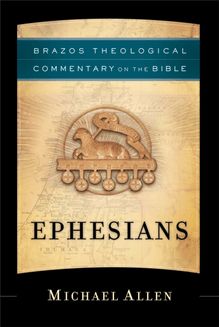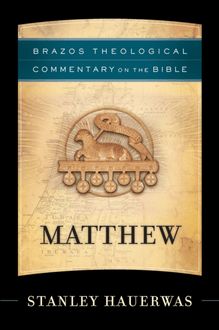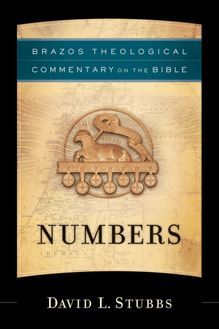1 Corinthians (Brazos Theological Commentary on the Bible) , livre ebook
277
pages
English
Ebooks
2022
Vous pourrez modifier la taille du texte de cet ouvrage
Obtenez un accès à la bibliothèque pour le consulter en ligne En savoir plus
Découvre YouScribe en t'inscrivant gratuitement
Découvre YouScribe en t'inscrivant gratuitement
277
pages
English
Ebooks
2022
Vous pourrez modifier la taille du texte de cet ouvrage
Obtenez un accès à la bibliothèque pour le consulter en ligne En savoir plus
Publié par
Date de parution
08 novembre 2022
Nombre de lectures
2
EAN13
9781493438389
Langue
English
Poids de l'ouvrage
2 Mo
Publié par
Date de parution
08 novembre 2022
Nombre de lectures
2
EAN13
9781493438389
Langue
English
Poids de l'ouvrage
2 Mo
Half Title Page
Series Page
Brazos Theological Commentary on the Bible
Series Editors
R. R. Reno, General Editor
First Things
New York, New York
Robert W. Jenson (1930–2017)
Center of Theological Inquiry
Princeton, New Jersey
Robert Louis Wilken
University of Virginia
Charlottesville, Virginia
Ephraim Radner
Wycliffe College
Toronto, Ontario
Michael Root
Catholic University of America
Washington, DC
George Sumner
Episcopal Diocese of Dallas
Dallas, Texas
Title Page
Copyright Page
© 2022 by Kimlyn Bender
Published by Brazos Press
a division of Baker Publishing Group
PO Box 6287, Grand Rapids, MI 49516-6287
www.brazospress.com
Ebook edition created 2022
All rights reserved. No part of this publication may be reproduced, stored in a retrieval system, or transmitted in any form or by any means—for example, electronic, photocopy, recording—without the prior written permission of the publisher. The only exception is brief quotations in printed reviews.
Library of Congress Cataloging-in-Publication Data is on file at the Library of Congress, Washington, DC.
ISBN 978-1-4934-3838-9
Unless otherwise indicated, Scripture quotations are from the New Revised Standard Version of the Bible, copyright © 1989 National Council of the Churches of Christ in the United States of America. Used by permission. All rights reserved.
Scripture quotations labeled JB are from THE JERUSALEM BIBLE, copyright © 1966 by Darton, Longman & Todd, Ltd. and Doubleday, a division of Random House, Inc. Reprinted by permission.
Scripture quotations labeled KJV are from the King James Version of the Bible.
Scripture quotations labeled NASB are taken from the (NASB®) New American Standard Bible®, Copyright © 1960, 1971, 1977, 1995, 2020 by The Lockman Foundation. Used by permission. All rights reserved. www.lockman.org
Scripture quotations labeled NIV are from THE HOLY BIBLE, NEW INTERNATIONAL VERSION®, NIV® Copyright © 1973, 1978, 1984, 2011 by Biblica, Inc.® Used by permission. All rights reserved worldwide.
Scripture quotations labeled NJB are from THE NEW JERUSALEM BIBLE, copyright © 1985 by Darton, Longman & Todd, Ltd. and Doubleday, a division of Penguin Random House, Inc. Reprinted by Permission.
Scripture quotations labeled RSV are from the Revised Standard Version of the Bible, copyright 1946, 1952 [2nd edition, 1971] National Council of the Churches of Christ in the United States of America. Used by permission. All rights reserved worldwide.
Baker Publishing Group publications use paper produced from sustainable forestry practices and post-consumer waste whenever possible.
Dedication
For my children Andrew, Stephen, and Karalyn
Since my youth, God, you have taught me, and to this day I declare your marvelous deeds. Even when I am old and gray, do not forsake me, my God, till I declare your power to the next generation, your mighty acts to all who are to come. Psalm 71:17–18 (NIV)
One generation shall praise thy works to another, and shall declare thy mighty acts. Psalm 145:4 (KJV)
So faith, hope, love abide, these three; but the greatest of these is love. 1 Corinthians 13:13 (RSV)
Contents
Cover
Half Title Page i
Series Page ii
Title Page iii
Copyright Page iv
Dedication v
Series Preface ix
Acknowledgments xv
Abbreviations xvii
Introduction 1
1 Corinthians 1 7
1 Corinthians 2 44
1 Corinthians 3 60
1 Corinthians 4 74
1 Corinthians 5 88
1 Corinthians 6 100
1 Corinthians 7 119
1 Corinthians 8 138
1 Corinthians 9 151
1 Corinthians 10 164
1 Corinthians 11 179
1 Corinthians 12 200
1 Corinthians 13 220
1 Corinthians 14 233
1 Corinthians 15 244
1 Corinthians 16 264
Select Bibliography of Modern Studies 269
Scripture and Ancient Writings Index 273
Author Index 287
Subject Index 291
Cover Flaps 299
Back Cover 300
Series Preface
Near the beginning of his treatise against gnostic interpretations of the Bible, Against Heresies , Irenaeus observes that scripture is like a great mosaic depicting a handsome king. It is as if we were owners of a villa in Gaul who had ordered a mosaic from Rome. It arrives, and the beautifully colored tiles need to be taken out of their packaging and put into proper order according to the plan of the artist. The difficulty, of course, is that scripture provides us with the individual pieces, but the order and sequence of various elements are not obvious. The Bible does not come with instructions that would allow interpreters to simply place verses, episodes, images, and parables in order as a worker might follow a schematic drawing in assembling the pieces to depict the handsome king. The mosaic must be puzzled out. This is precisely the work of scriptural interpretation.
Origen has his own image to express the difficulty of working out the proper approach to reading the Bible. When preparing to offer a commentary on the Psalms he tells of a tradition handed down to him by his Hebrew teacher:
The Hebrew said that the whole divinely inspired scripture may be likened, because of its obscurity, to many locked rooms in our house. By each room is placed a key, but not the one that corresponds to it, so that the keys are scattered about beside the rooms, none of them matching the room by which it is placed. It is a difficult task to find the keys and match them to the rooms that they can open. We therefore know the scriptures that are obscure only by taking the points of departure for understanding them from another place because they have their interpretive principle scattered among them. 1
As is the case for Irenaeus, scriptural interpretation is not purely local. The key in Genesis may best fit the door of Isaiah, which in turn opens up the meaning of Matthew. The mosaic must be put together with an eye toward the overall plan.
Irenaeus, Origen, and the great cloud of premodern biblical interpreters assumed that puzzling out the mosaic of scripture must be a communal project. The Bible is vast, heterogeneous, full of confusing passages and obscure words, and difficult to understand. Only a fool would imagine that he or she could work out solutions alone. The way forward must rely upon a tradition of reading that Irenaeus reports has been passed on as the rule or canon of truth that functions as a confession of faith. “Anyone,” he says, “who keeps unchangeable in himself the rule of truth received through baptism will recognize the names and sayings and parables of the scriptures.” 2 Modern scholars debate the content of the rule on which Irenaeus relies and commends, not the least because the terms and formulations Irenaeus himself uses shift and slide. Nonetheless, Irenaeus assumes that there is a body of apostolic doctrine sustained by a tradition of teaching in the church. This doctrine provides the clarifying principles that guide exegetical judgment toward a coherent overall reading of scripture as a unified witness. Doctrine, then, is the schematic drawing that will allow the reader to organize the vast heterogeneity of the words, images, and stories of the Bible into a readable, coherent whole. It is the rule that guides us toward the proper matching of keys to doors.
If self-consciousness about the role of history in shaping human consciousness makes modern historical-critical study actually critical, then what makes modern study of the Bible actually modern is the consensus that classical Christian doctrine distorts interpretive understanding. Benjamin Jowett, the influential nineteenth-century English classical scholar, is representative. In his programmatic essay “On the Interpretation of Scripture,” he exhorts the biblical reader to disengage from doctrine and break its hold over the interpretive imagination. “The simple words of that book,” writes Jowett of the modern reader, “he tries to preserve absolutely pure from the refinements or distinctions of later times.” The modern interpreter wishes to “clear away the remains of dogmas, systems, controversies, which are encrusted upon” the words of scripture. The disciplines of close philological analysis “would enable us to separate the elements of doctrine and tradition with which the meaning of scripture is encumbered in our own day.” 3 The lens of understanding must be wiped clear of the hazy and distorting film of doctrine.
Postmodernity, in turn, has encouraged us to criticize the critics. Jowett imagined that when he wiped away doctrine he would encounter the biblical text in its purity and uncover what he called “the original spirit and intention of the authors.” 4 We are not now so sanguine, and the postmodern mind thinks interpretive frameworks inevitable. Nonetheless, we tend to remain modern in at least one sense. We read Athanasius and think of him stage-managing the diversity of scripture to support his positions against the Arians. We read Bernard of Clairvaux and assume that his monastic ideals structure his reading of the Song of Songs. In the wake of the Reformation, we can see how the doctrinal divisions of the time shaped biblical interpretation. Luther famously described the Epistle of James as an “epistle of straw,” for, as he said, “it has nothing of the nature of the gospel about it.” 5 In these and many other instances, often written in the heat of ecclesiastical controversy or out of the passion of ascetic commitment, we tend to think Jowett correct: doctrine is a distorting film on the lens of understanding.
However, is what we commonly think actually the case? Are readers naturally perceptive? Do we have an unblemished, reliable aptitude for the divine? Have we no need for disciplines of vision? Do our attention and judgment need to be trained, especially as we seek to read scripture as the living Word of God? According to Augustine, we all struggle to journey toward God, who is our rest and peace. Yet our vision is darkened and the fetters of worldly habit corrupt our judgment. We need training and instruction in order to cleanse our minds so that we might f












